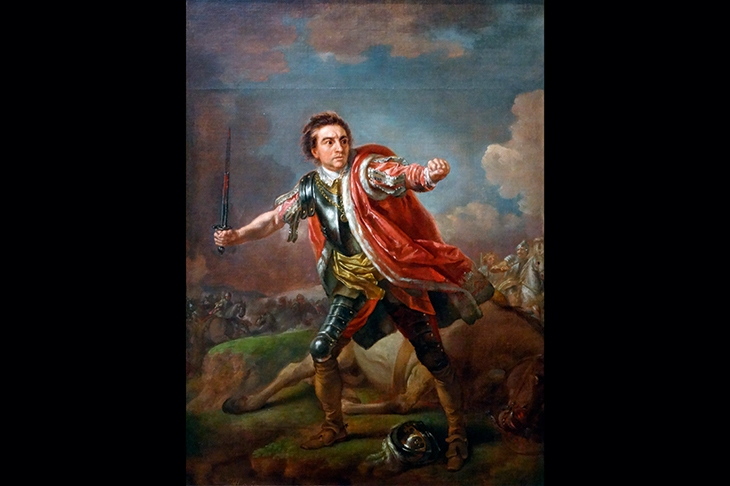The age of Garrick, Norman Poser, a law professor, insists, gave us much of what we take for granted today in the theatre: ‘naturalistic’ acting, and, as Dr Johnson remarked, the very idea of the business of acting as a profession. Hence this book’s portentous title. Its curtain raiser trumpets themes of fame, personality, interiority and cultural self-knowledge, but regrettably Poser’s main show offers a trawl through anecdotes in a style and structure more wooden than the monopedal comic actor Sam Foote’s peg leg.
Naturalism in acting, it is often said, originated in this era. But it’s a subject as large as it’s slippery. There is limited source material on what the style was really like, and there is no obvious chain of apostolic delegation to be found, as Poser asserts, from Garrick through to Stanislavski, let alone to ‘Marilyn Monroe, Al Pacino and Hilary Swank’.
As Lord Fellowes recently remarked, every generation, no matter how it repines the passing of old times, believes two things of itself: that it has worked out a better way to parent and a better way to act. That’s always wrong. The point is to try to work out what might have changed and when and why. The power and metaphorical heft of theatrical art is its evanescence — it exists for that moment and that audience. Quoting the musical Hamilton or referencing Angelina Jolie in the body of the text, while showing a suitable enthusiasm for the performing arts, isn’t enough to understand these changes and that audience. Much better to turn to the novel, or indeed to the portraiture of Garrick’s friend Reynolds, or the works of the French philosophes with which Garrick was familiar, to discuss what might have been the burgeoning sense of interiority and how it was represented.
Poser evidently loves London and its theatres. He is good on the largely forgotten Actors’ Strike of the 1740s, and on the important ‘Irishness’ of the British theatre in this period — and on theatre-going as an experience — where anecdotes pile up into a sort of theory-of-audience, giving a greater sense of why riots were not only tolerated but almost encouraged. However, he presents no evidence to support his assertion that these riots were a symptom of the ‘seething cauldron of class resentment, even hatred’ in London, and he may well be wrong: riots began as often as not in the more expensive seats.
He is also wrong to impose a modern sensibility on ‘the habit of young rakes [invading actresses’ dressing rooms] with impunity’, which fundamentally misunderstands the economy — actual and sexual — of 18th-century society. The interesting issue is the way a prurient regard into the private lives of ‘stars’ was traded in the economy of fame itself — something very familiar to the selfie generation but born exactly of this period.
Poser goes further afield elsewhere, suggesting that the main reason that acting gained the status of the other liberal arts, such as painting, music and literature, in Augustan London was ‘due to the celebrity of Garrick and a few others’. That is highly questionable. It took another two generations for an actor to be knighted; and the term ‘celebrity’ was unknown to Garrick or his famous friends.
And minor errors abound. Susannah Cibber did not face an ‘adultery lawsuit’ per se from Theophilus Cibber; he sued her lover, as was standard. ‘Rule Britannia’ was written for a theatrical masque, as part of Thomas Arne’s Alfred; Rosaline is an offstage character in Romeo and Juliet; and Cannons, not Cannon, Park, is almost certainly not where Foote lost his leg, which in any event is some 60 miles from London, not 12. He probably lost his left leg, not his right.
Our guide to the past looks unsteady on his raked stage. Somewhere buried under the palimpsest of half-recorded performance memories, somewhere under the larrikin story of the boy from Dr Johnson’s school in Lichfield and the first modern metropolis, just as it begins a discussion with itself about personality and about what is funny and true and honest, can be found the genesis of modern acting and the ongoing importance of modern theatre. But not here.






Comments